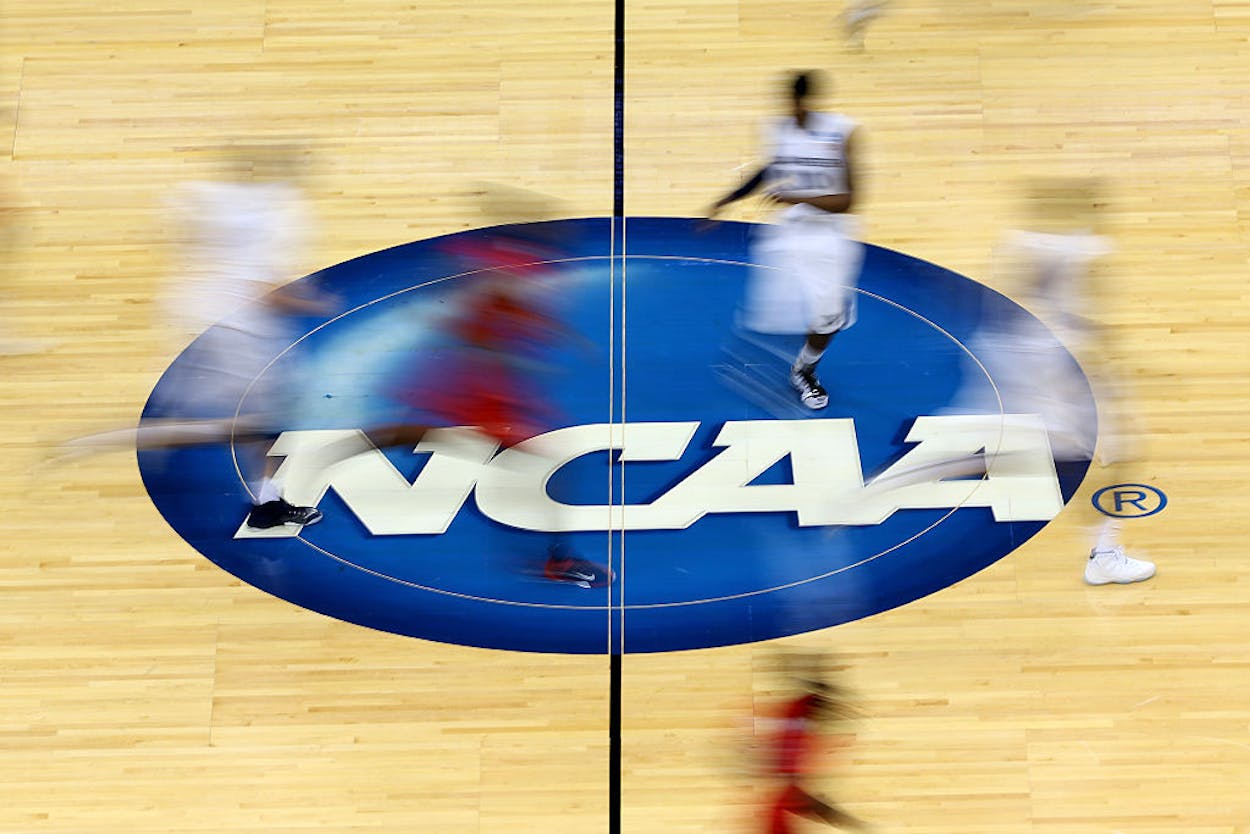The Texas Legislature passed a version of the so-called “bathroom bill” on Sunday, and the ball is now in the NCAA’s court. The college sports governing body made waves in March when it boycotted North Carolina after the state passed legislation that restricted bathroom access for transgender people. The NCAA took a tough stance with the North Carolina Legislature: Fix this, or we won’t host another championship event in your state.
The NCAA’s boycott in North Carolina had huge ramifications. North Carolina—home to Duke University, the University of North Carolina, and a host of other major college sports programs in the Atlantic Coast Conference—is a college sports hotbed, and the industry is a significant factor in the state’s economy. The NCAA offered its ultimatum on the cusp of NCAA Men’s Basketball Tournament, moving the first two rounds of the tournament from its scheduled host site in Greensboro across the border to South Carolina and threatening to keep all of the organization’s championship events out of the state until 2020. Faced with the prospect of losing hundreds of millions of dollars in revenue from the NCAA’s boycott alone, North Carolina scrambled to repeal the bill, and it was replaced by a law that is less restrictive than the first, though it still drew criticism from LGBT advocates for not going far enough. The NCAA was apparently appeased, and the boycott was lifted in April.
It’s unclear if Texas will face the same fate. At no point during the saga leading up to Sunday’s vote did the NCAA publicly comment on Texas’s proposed bathroom restrictions. We reached out to the NCAA, asking whether it will boycott Texas, or if it views the bathroom legislation passed by the House as different from North Carolina’s, and why. We haven’t heard anything back, and we’re not alone: Deadspin, Vocativ, Bloomberg and the San Antonio Business Journal have also reached out to the organization to no avail (the ACC also boycotted North Carolina; we reached out to the Big 12 Conference, which hosts a handful of championship events in Texas every year, but have not received a response).
The NCAA’s silence may be in part because the House version, which was passed as an amendment to Senate Bill 2078, is viewed as less divisive than the earlier proposed bathroom legislation backed by Lieutenant Governor Dan Patrick, Senate Bill 6. That bill, which was far more sweeping, would have forced people to use bathrooms in government buildings and public schools that match their “biological sex,” along with prohibiting local governments from implementing their own transgender-inclusive bathroom regulations. The House version, as we reported earlier this week, “is limited to providing private bathrooms in public schools and open enrollment charter schools to children who want to opt out of bathrooms assigned to a specific biological sex.” In a statement after the House version was passed, House Speaker Joe Straus said it “will allow schools to continue to handle sensitive issues as they have been handling them.” Straus added that he believes it will save Texas from “the severely negative impact of Senate Bill 6,” alluding to the potential fallout from business groups who have vocally opposed these bathroom restrictions.
If the NCAA were to boycott Texas, the impact would be pretty big. The state is slated to host seven college football postseason bowl games next year, along with the 2018 men’s basketball Final Four in San Antonio. The Alamo City is expected to rake in more than $100 million when the tournament comes to town in March.
It’s also worth noting that the NCAA once before had the opportunity to take a stand on transgender-inclusive policies in Texas. Leading up to the 2016 Final Four in Houston, the city voted against a non-discrimination ordinance that would have, along with establishing other protections, allowed transgender people to use public restrooms that align with their gender. But the NCAA did nothing—the show went on in Houston. “We expected the NCAA—because in many ways it’s a national business organization, like the many others that supported this law—we expected them to make some kind of statement before the vote,” Terri Burke, executive director of the ACLU of Texas, told the Washington Post in March last year. “But they declined to even talk to us about it. It’s unfortunate… I wish they would’ve gotten out in front on this one.”
While the NCAA once again stays silent, the SB 2078 amendment has already drawn sharp criticism from the LGBT community and civil rights advocates. “The Texas legislature is cynically advancing an aggressive agenda of discriminatory legislation for political gain,” Rebecca L. Robertson, legal and policy director for the ACLU of Texas, said in a statement. “The so-called bathroom amendment approved by the House [Sunday] night is billed as a compromise, but there can be no compromise on discrimination. Transgender children aren’t bargaining chips for lawmakers to trade, and their safety and dignity are non-negotiable.”
For advocates, the economic impact of college sports, of course, is second fiddle to the effect this amendment is expected to have on the daily lives of transgender kids. According to the Associated Press, the bill would essentially out transgender kids in front of their classmates and teachers by forbidding them to use the bathroom aligning with the gender they associate with, or sending them to a conspicuous separate single-stall bathroom. “Let’s be honest and clear here: This amendment is the bathroom bill, and the bathroom bill is an attack on transgender people,” state Representative Joe Moody, a Democrat from El Paso, said, according to the Texas Tribune. “Some people don’t want to admit that. Maybe that’s because they’re ashamed, but make no mistake about it—this is shameful.” If the NCAA is planning to make some sort last stand here, it’s running out of time. Governor Greg Abbott is expected to sign the bathroom bill by the end of this week.






